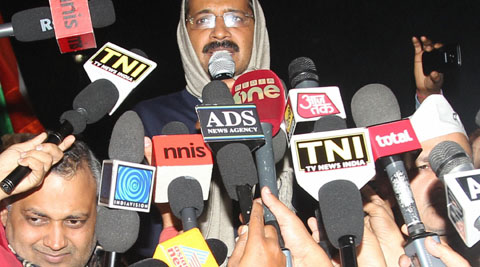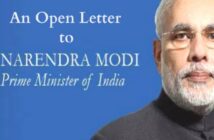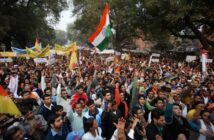 There can be no worse travesty of justice in India’s electoral politics than to create a hype that the Aam Aadmi Party led by Arvind Kejriwal has emerged as an alternative to narendra Modi. Worse even is the propaganda that Kejriwal is now the face of honest politics across the country.
There can be no worse travesty of justice in India’s electoral politics than to create a hype that the Aam Aadmi Party led by Arvind Kejriwal has emerged as an alternative to narendra Modi. Worse even is the propaganda that Kejriwal is now the face of honest politics across the country.
Beyond the fact that Kejriwal’s integrity has been questionable right from the very beginning and beyond the fact that he has no unique vision of economic growth than the tried and tested populism, lies the fact that the only message in his electoral victory has been a wave against the Congress party. And Arvind Kejriwal proved to be smart enough to play with the psychology of the media which needed an element of novelty in the national mainstream.
As a matter of fact, the national media and Arvind Kejriwal are today complementing each other in terms of creating an atmosphere where evoking public sentiment is the sole objective. Does it make Arvind Kejriwal a national leader? Can he be the face of nationally accepted challenge to Centre the way Congress can?
The answer to this question is a counter question in itself—does Kejriwal has that element of novelty to offer across the country which he so smartly played in Delhi? Even in Delhi all the high voltage media orchestrated campaign could not give him a decisive mandate in the firt attempt. In the second attempt the infighting of the BJP, added with his malicipus campaign against the BJP and fear psychosis among Congress voters worked.
Worse even, he had to ally with the same Congress against whom he started his political campaign in the first attempt. It just reminds of the ‘India Shining’ campaign of Atal Behari Vajpaee Government where a section of media went over-board in calling Vajpayee’s term as ‘Golden Era’ of Indian politics.
Unfortunately, the nation does not exist in Delhi nor goes to vote as per the whims and fancies of a few journalists who influence the news room of these TV channels. India is too large and heterogeneous in terms of its local needs, aspirations and political orientation.
And the reasons why national political parties are increasingly losing to the regional parties are precisely the same—they cannot take one stand in one part of the country and contrary stand in other part.
Kejriwal also understands this dilemma and the cunning politician in him is thus avoiding all the relevant national issues and focussing only on the oft-repeated secularism, even at the cost of relegating the corruption agenda to dustbin.
This worked for him to some extent in Delhi, but will definitely not work in the vast heartland where the regional political parties are too deep rooted to address those issues.
More importantly, his evasive stance on core issues like reservation, social justice, Kashmir etc will get exposed soon, and much like the two national parties he will lose out to the regional forces in the process.
The media in the process has been repeatedly trying to force feed the message to the two national political parties that this is the changing face of Indian politics and they need to change. This is media’s sure shot recipe of disaster.
For instance, the Congress party has suffered much worse electoral set-back in the past, be it post the JP Movement or after the VP Singh’s rebellion on alleged corruption in Bofors. If Congress could fight it out and come back strongly, it was because the party did never try to copy the style of JP, Lohiya or VP Singh. Nor should it do now, come what may.
Similarly, the BJP should not be much worried over the media verdict of Kejriwal playing spoiler to the party of Narendra Modi. The world is not lost if BJP lost elections in Delhi. But if the BJP tries to compromise with its core issues and agenda, then definitely it is doom day ahead.
In the past, the comeback of BJP strongman Yedurappa in Karnataka is a strategically more smart move for the BJP then heeding to what media tells the BJP.
After all, the strength of both the national parties are their regional leaders today, and howsoever corrupt or disgraceful they may have been they are repeatedly being elected not by the mercy of media but on the merit of their grass root connect.
To assume that suddenly the conscience of the people has been awakened and they will turn hostile to their political loyalty and opt for a new so-called honest party should be too hypothetical to be believed by the national political parties.
The challenge today for the national political parties is to not get into the trap of copying the style of politics what the media says is now reality. It is not politics of denial, as suggested by the media but it is the politics of not falling into the trap of holier-than-thou kind of politics that should be the focus of the political parties.
By: Ravi Sinha




